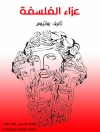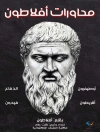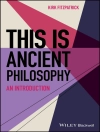A comprehensive yet accessible survey of ancient philosophy, covering Greek, Roman, and early Judeo-Christian philosophy, ideal for introductory courses in the ancient roots of modern worldviews
Part of the popular Fundamentals of Philosophy series, Ancient Philosophy is an ideal resource for beginning students as well as for advanced students wishing to hone their understanding of the philosophies of the ancient world. Clear and engaging, this book covers a representative selection of major ancient thinkers, movements, and schools of thought, including the Sophists and other significant Presocratics, Socrates, Plato, Aristotle, Hellenistic philosophy, the Stoics, the Skeptics, and early Judeo-Christian philosophy up to Augustine. Written by a prominent scholar and author in ancient philosophy studies, this book:
* Provides an overview of important issues in the study of the philosophies of the ancient world
* Explores the relevance of the theories of ancient thinkers to the modern world
* Charts the progression in the ancient world from worldviews based in mythology to systems of thought based on the analysis of evidence
* Presents up-to-date scholarship as well as historical material from ancient sources
* Assumes no prior knowledge of philosophy and examines all arguments carefully and sequentially
Inhaltsverzeichnis
Preface viii
1 Introduction 1
1.1 From Mythology to Philosophy 2
1.2 History and Philosophy 3
1.3 Overview 7
Notes 14
2 The Presocratics 15
2.1 The Birth of the Gods 15
2.2 A New Way of Understanding 16
2.3 Theories of Matter 17
2.4 Parmenides’s Criticisms of Natural Philosophy 23
2.5 After Parmenides 27
2.6 Cosmogony and Cosmology 31
2.7 Sophistic 34
2.8 Conclusion 39
Notes 40
3 Socrates 42
3.1 The Socratic Problem 42
3.2 Socratic Paradoxes 45
3.3 Negative Method 47
3.4 Intellectualism 49
3.5 Living Virtuously 51
3.6 Logic Therapy 54
3.7 Socrates and the State 57
3.8 Conclusion 59
Notes 60
4 Plato 63
4.1 Life and Work 63
4.2 The Soul and Knowledge 67
4.3 The Transcendent Forms 69
4.4 The Forms and the Soul 70
4.5 The Republic 73
4.6 The Theory of Forms and Its Problems 79
4.7 Cosmology, Science, and Theology 84
4.8 Conclusion 87
Notes 87
5 Aristotle 89
5.1 Life and Works 89
5.2 Basic Ontology 92
5.3 Logic, Science, Knowledge 96
5.4 Nature, Change, and Explanation 100
5.5 Cosmology 109
5.6 Psychology 113
5.7 Metaphysics 116
5.8 Ethics 118
5.9 Conclusion 127
Notes 128
6 Hellenistic Philosophy 130
6.1 Epicureanism 131
6.2 Stoicism 137
6.3 Skepticism 147
6.4 Conclusion 154
Notes 155
7 Plotinus and Neoplatonism 156
7.1 Middle Platonism 157
7.2 Plotinus 158
7.3 The Hierarchy of Being 159
7.4 Souls 162
7.5 Ethics 164
7.6 Greco-Roman Theology 166
7.7 Influence 169
Notes 170
8 Augustine and Christian Philosophy 172
8.1 Jewish Intellectual Developments 172
8.2 Early Christian Thought 175
8.3 Augustine 178
Notes 187
References 189
Index 198
Über den Autor
Daniel W. Graham is Professor of Philosophy at Brigham Young University. He is past president of the International Association for Presocratic Studies. He is author of Aristotle’s Two Systems, co-editor of The Oxford Handbook of Presocratic Philosophy, editor and translator of The Texts of Early Greek Philosophy, and author of Science Before Socrates. He has been a visiting fellow at Clare Hall, Cambridge, and a visiting professor at Yale University.












